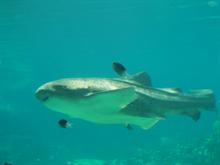
Since sharks are able to communicate with audio and visual signals, the use of sounds and coloured boards have become part of shark training routines (similar methods are used in dog training). One of the best techniques to achieve success in shark training is through using food. Here, the shark will see or hear a “target stick” that the keeper holds in their hand to indicate to the shark the command that food is available. The shark approaches the stick and rubs its nose against it while waiting to be fed. It should take no more than an intensive 3 month period of training for a shark to learn to respond to commands.
Basically, how this works is all the sharks are given an auditory call and each shark species responds to their own “auditory bell”. After that, differently shaped coloured boards are put in the water (contrasting colours are mainly used because if sharks can’t see one specific colour, they will see the contrast and understand that that’s their shape).
As they approach their own shape, the food is placed at the tip of tongs as a positive reinforcement.
A trained shark is a very enlightening and rewarding experience for trainers because they get to perceive that sharks aren’t just the typical stereotype they are often classified as – ‘deadly predators that will attack anything anytime’. Some sharks have been seen to perform like a playful seal and others seem to enjoy affection or touch (e.g. tiger sharks enjoy being rubbed on their belly and on their nose).
One of the main purposes for training a shark is to maintain animal healthcare and welfare. A captive shark that has learnt to respond positively to commands will have a better chance of remaining free from boredom. It will also voluntarily come to the keeper’s call if it is ever ill, which makes it easier for a vet to attend to it poolside, or to transport it to a vet without having to chase it -which reduces the chances of it getting stressed.
Read more on Animal Psychology with our new Animal Psychology ebook-
Animal Psychology- Comparing the Psychology of Different Animals.